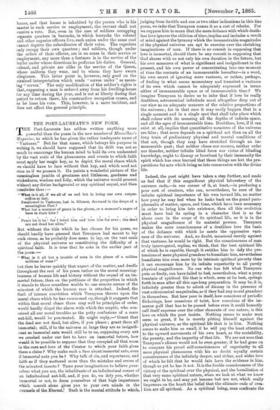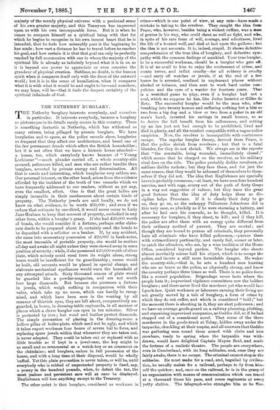THE POET-LAUREATE'S NEW POEM.
THE Poet-Laureate has seldom written anything more powerful than the poem in the new number of Macmillan's Magazine, to which he has given the rather inadequate name of Vastness." But for that name, which betrays his purpose in writing it, we should have supposed that its drift was not so much to encourage the human mind to hold its own undaunted by the vast scale of the phenomena and events to which faith must apply her magic key, as to depict the moral chaos which we should have to face without that key, and which need not stun us if we possess it. He paints a wonderful picture of the meaningless jumble of greatness and littleness, goodness and wiekednesa, wisdom and folly, which the universe would present without any divine background or any spiritual sequel, and then cowhides thus :- " What is it all, if we all of us end but in being our own corpse- coffins at last,
Swallowed in Vastness, lost in Silence, drowned in the deeps of a meaningless Past ?
What but a murmur of gnats in the gloom, or a moment's anger of bees in their hive ?
•
Peace let it be for I loved him and love him for eve; ; the dead are not dead bat alive."
But without the title which he has chosen for his poem, we should hardly have guessed that Tennyson had meant to lay such stress, as he probably does mean to lay, on the vast scale of the physical universe as constituting the difficulty of a spiritual faith. It is true that he asks in the earlier part of the poem :—
" What is it all but a trouble of ants in the gleam of a million millions of suns ?"
but then he leaves quickly that aspect of the matter, and dwells throughout the rest of his poem rather on the moral meaning- lessness of human life and history without the sequel of an im- mortal future, than on the pettiness of the proportion in which it stands to those countless worlds to one remote corner of the minutest of which the human race is attached. Indeed, the flash of intense conviction which Tennyson throws upon the moral chaos which he has summoned up, though it suggests that within that moral chaos there may well be principles of order, would hardly dispel the alarm with which the sceptic, who con- ceived all our moral troubles as the petty confusions of a mere ant-hill, would be penetrated. He might reply,—' Grant that the dead are not dead, but alive, if you please ; grant them all immortal; still, if to the universe at large they are as insignifi- cant as immortal ants would still be to us, supposing every ant we crushed under our feet to have an immortal future, how would it be possible to suppose that they occupied all that room in the care and love of the Creator to which your faith gives them a claim ? Why make such a fuss about immortal ants, even if immortal ants you be ? Why talk of sin, and repentance, and faith as if they mattered more than the mistakes and errors of the minutest insects P Tame your imaginations to believe your- selves what you are, the inhabitants of an infinitesimal corner of an infinitesimal ant-hill, and, if you do, we defy you, whether immortal or not, to deem yourselves of that high importance which conceit alone gives you to your own minds in the commis of the Eternal:, Such is the mental attitude to which, judging from its title and one or two other indications in this fine poem, we infer that Tennyson means it as a sort of rebuke. For we suppose him to mean that the mere defiance with which death- less love ignores the oblivion of time, implies and includes a revolt of mind against the tyranny which the inconceivable magnitudes of the physical universe are apt to exercise over the shrinking imaginations of men. If there is no conceit in supposing that love is immortal, should there be any conceit in supposing that God shares with us not only his own duration in the future, but his own measures of what is significant and insignificant in the present, and his own power of concentrating into one moment of time the contents of an immeasurable hereafter—in a word, his own secret of ignoring mere vastness, or rather, perhaps, of finding in what seems momentary and transient a vastness of its own which cannot be adequately expressed in terms either of immeasurable space or of immeasurable time P We imagine Tennyson to desire us to infer that if love be really deathless, astronomical infinitude must altogether drop out of our view as an adequate measure of the relative proportions of the universe ; for in that case it may easily happen that in a single moment and in a single spot that shall take place which shall colour with its meaning all the depths of infinite space, and all the ages of immeasurable time. Doubtless, love, if it can exist at all, implies that quantitative measures of the universe are false ; that more depends on a spiritual act than oa all the long train of preliminary physical and mental conditions of that act, though they may have stretched through an im- measurable past ; that neither chaos nor cosmos, neither order nor disorder, neither infinite blind force nor vistas of blinding knowledge, ought to dismay or browbeat by their immensity the spirit which has once learned that these things are but the pre- parations for acts which bring us into communion with the divine life.
Indeed, the poet might have taken a step further, and made us feel that if this magnificent physical laboratory of the universe ends,—in one corner of it, at least,—in producing a poor sort of creature, who can, nevertheless, be sure of the infinite spiritual importance of his own inward life, no matter how puny he may feel when he looks back on the grand para- phernalia of matter, space, and time, which have been necessary in order to bring him into existence, then all this evolution must have had its spring in a character that is as far above ours in the scope of its spiritual life, as it is in the physical magnificence of its material powers. Tennyson makes the mere consciousness of a deathless love the basis of the defiance with which he meets the oppressive vast- ness of the universe. And, no doubt, measured merely against that vastness, he would be right. Bat the consciousness of man. truly interrogated, replies, we think, that the best spiritual life of which he is capable, though it entitles him to defy the pre- tensions of mere physical grandeur to humiliate him, nevertheless humiliates him even more by its intrinsic spiritual poverty than it can encourage him by its infinite superiority to all purely physical magnificence. No one who has felt what Tennyson puts so finely, can have failed to feel, nevertheless, what a puny fountain of spiritual life that is which, even at its beat, springs forth in man after all this age-long preparation. It may be, it is, infinitely greater than to admit of dismay in the presence of vast astronomical magnitudes, as if they had any moral grandeur in themselves. But how poor in itself, how conscious of periodic flickerings, how conscious of taint, how conscious of the im- mense gulf that has to be passed before even it could honestly call itself supreme over the other elements of our nature, is this love on which the poet insists. Nothing seems to make man seem so great, if he is merely pitting himself against the physical universe, as the spiritual life that is in him. Nothing seems to make him so small, if he will pay the least attention to the upward movements of his own heart, as the mutability, the poverty, and the impurity of that life. We are not sure that Tennyson's climax would not be even greater, if he had gone on to compare his proud self-consciansness of superiority to all mere physical phenomena with his no doubt equally certain consciousness of the infinitely deeper, and richer, and wider love of which he felt that he would fain have the evidence in him, though as yet he has it not. It is the double consciousness of the victory of the spiritual over the physical, and the humiliation of that very same spiritual nature, when we look at what we know we ought to be, and may yet become but are not, which really impresses on the heart the belief that the ultimate ends of crea- tion are all spiritual. As a spiritual being, man confronts the
majesty of the merely physical universe with a profound sense of his own greater majesty, and this Tennyson has impressed upon us with his own incomparable force. But it is when he comes to compare himself as a spiritual being with that for which he begins to recognise in his own inmost heart that he is intended, that he feels how miserably poor is the beginning he has made ; how vast a distance be has to travel before be reaches his goal, and how certain it is that that goal can only be perfectly reached by full communion with one in whom the majesty of the spiritual life is already as infinitely beyond what it is in us, as it is beyond our power to appreciate or even conceive the grandeur of physical creation. Sublime, no doubt, is the human spirit when it compares itself only with the force of the outward world ; but it is in the sense of humiliation, when it compares what it is with what it would be and ought to be—and somehow, we may hope, will be—that it finds the deepest certainty of the spiritual infinitude of God.















































 Previous page
Previous page